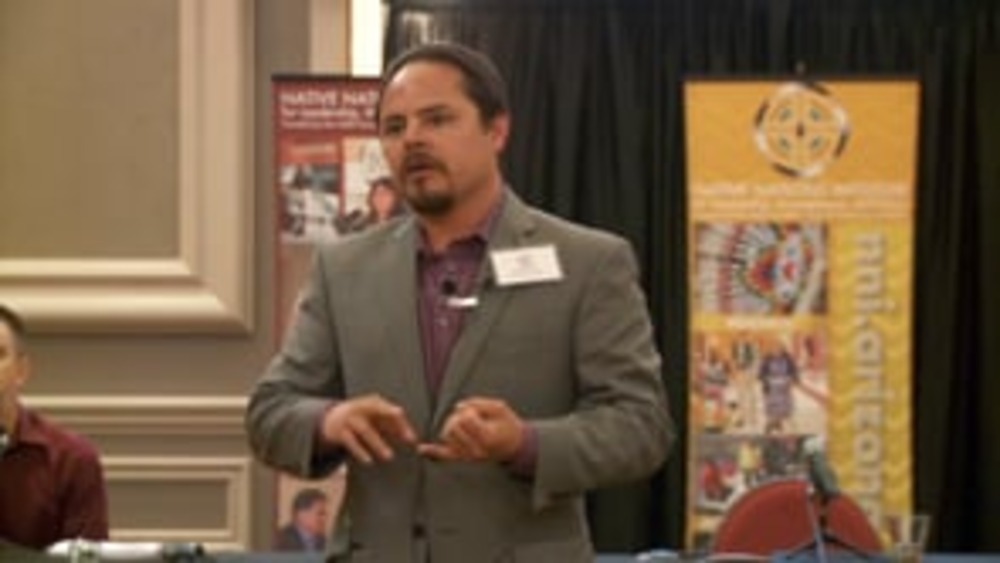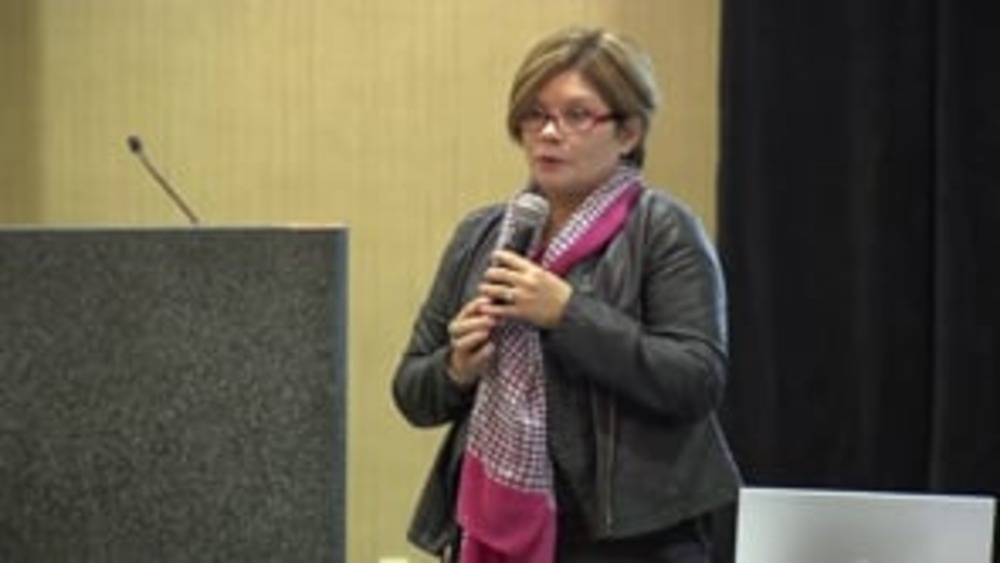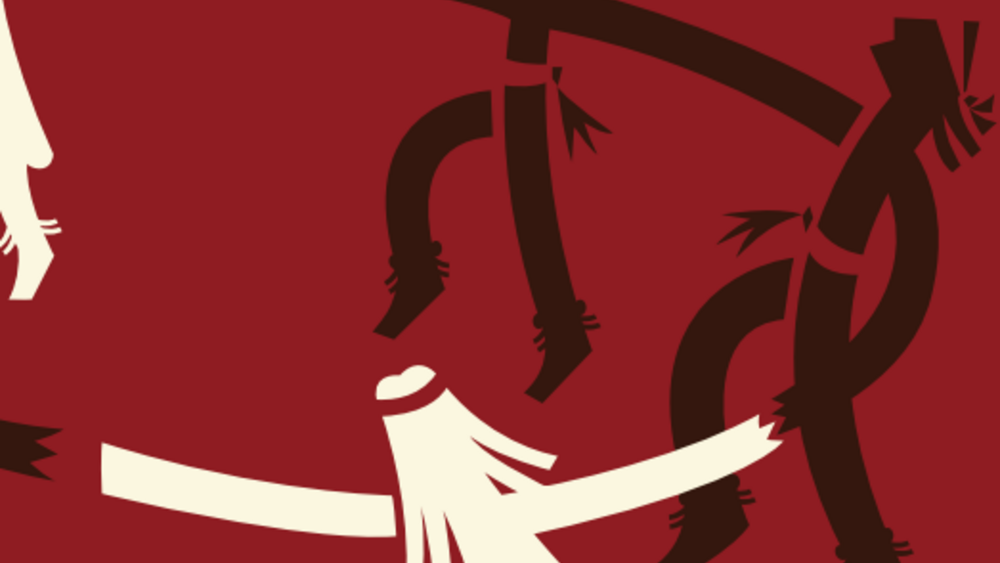Carlos Hisa and Zeke Garcia from Ysleta del Sur Pueblo (YDSP) field questions about YDSP's current community-based effort to redefine its criteria for citizenship, and they provide additional detail about the great lengths to which YDSP has gone in order to document the origins and history of their current criterion for citizenship (blood quantum) in order to make an informed decision about whether/how to change it.
Additional Information
Garcia, Esequiel. "Ysleta del Sur Pueblo: Redefining Citizenship." Tribal Constitutions seminar, Native Nations Institute for Leadership, Management, and Policy, University of Arizona. Tucson, Arizona. April 2, 2014. Q&A session.
Hisa, Carlos. "Ysleta del Sur Pueblo: Redefining Citizenship." Tribal Constitutions seminar, Native Nations Institute for Leadership, Management, and Policy, University of Arizona. Tucson, Arizona. April 2, 2014. Q&A session.
Transcript
Ian Record:
"We have about 10 to 15 minutes for question and answers before we break for lunch and we have microphones set up here on the...just in front of the panelists here and then there's also one... Steve's got a running mic there in the back. He's quite swift, so here we go, Terry."
Terry Janis:
"Yeah, I'm Terry Janis working with the White Earth Nation on these issues for the last year. First of all, I commend you on getting the information to your tribal members. That's huge if you're going to make a solid decision on this and be a part of it. Two basic questions: one is [audio cuts out for a few seconds] ...conversation that is more about limited resources, right? We have limited resources. If we double the population, will the system take more away from us? How much of that is a part of the conversation and how do you resolve it? And then the second question is have you started thinking about the verbiage of the language of how this phase is going to be laid out? Is it just going to be straight moving to descendency or is there going to be more of a process as was discussed earlier of dislocation, engagement and involvement on the part of being enrolled into citizenship?"
Carlos Hisa:
"To your first question about whether it's a concern about the services we're providing and the cost-benefit or will we really need to adjust, like Zeke said, we did send out a survey and I was astonished with the responses. The descendants don't want to be a burden. They want to do what they need to do for the Pueblo. They want to do their part. We have mentioned to the community that the biggest impact is going to be in health care because in the other areas we have been providing for descendants as we recognize them when it comes to education, when it comes to other things. It's just health care that's going to be the big one and in my conversations to the youth, the descendants out there, they're willing to give that up, for our elders, for those that really need it. So it's not...the discussions haven't really been focused on the benefits we're going to receive by the federal government to more as, 'We're Tigua now, we're going to be recognized as such.' So that's something that...it's unbelievable to me because that's the way I was raised, and for a period of time I thought that was fading away, but it's obviously there. We planted that seed and it's still there. The second question..."
Esequiel (Zeke) Garcia:
"What was the second question?"
Terry Janis:
"It's more about what sort of language are you going to utilize to define citizenship, just straight lineal descendancy language or is there going to be more language on involvement, participation, understanding of community, etc.?"
Carlos Hisa:
"That is the beauty of getting the community involved and having this board because the board consists of elders, people that have been there before in council, individuals that are outsiders that live out of town, descendants. So it's a good group of different aspects. So when the discussions are coming, those questions are brought up. What is a Tigua? To me -- and that's what I always tell my daughters, 'No document that's out there, no blood quantum requirement is going to identify who you are as Tigua.' I said, ‘It's what you do for the community. Your involvement spiritually, emotionally and physically is what identifies you as such.' But that's just me, the way I was raised. We need to hear from everybody.
But those conversations are being held when we have our meetings as a board. I, in the beginning, stepped away and said, ‘I want this board to function on its own.' But I was quickly dragged back into it because it is a sensitive issue and there's a lot of opinions and very...people are very passionate about it, so they're wanting to go out there and implement these type of things. If you want to be a Tigua, this is going to be your responsibility. Like I said, we don't have a constitution. We are governed by oral tradition and the way it's been taught to us in the past is we don't want to put it in writing per se because if you want to know it, you've got to live it. If you want to stay away, well, stay away and once you become...you come, we're always going to embrace you, come over, the doors are always open. But when you start living this way of life and understanding, you understand the essence of what we have in place, you'll feel it, you'll know it. But again, that's just me. That's the just the way I've been taught.
Things have changed, but those conversations are being held, and together as a community I know we're going to come up with something strong, something that's going to stay there for a long time. At the same time, it's not going to be sketched in stone. If there's something that we need to change and learn from, it's all going to...we're going to be able to have that flexibility, but again it's going to have to involve the entire community as a whole. I hope I answered your questions there."
Audience member:
"...And how do you...what are some of the strategies to meet that goal and to say it's the will of our people so that we need to make this decision?"
Carlos Hisa:
"I see the point. What we're trying to...what we're doing, we're in the process of doing is getting all the information together. First, what our people see as identity like he said, one of the things we had on there. Okay, we're going to identify who we are. These components identify who we are as a people. Those are being identified. The survey we have, we're getting that information on there. That's being put together. We don't have the complete report; hopefully by the end of this month we'll have it. The other thing is looking at...showing the community as a whole what the impact's going to be financially. We want to get all that information together and create a...I guess a final decision...resolution to be able to present to the community and say, ‘After all the research that we've done, this is what we see as a council [is] the right way to go,' and present it to the community. And like Zeke said, we have quarterly meetings, and you call them like town halls, where we invite the entire community to come and make decisions on things like this. We will present the information and make a couple of, I guess, suggestions on how we can move about and we'll allow the community to vote on that decision. Again, that's something that we're going to put together and recommend to the community once we have all the information in place."
Ian Record:
"If there's no other questions at the ready, I had a question and it's sort of a leading question because I've been involved with this effort in a very peripheral way, but...and it really speaks to what John [Borrows] was bringing up with basically imploring folks to think about your own histories as you engage this issue. And what I was really struck by in working with Ysleta del Sur last summer is the lengths to which you guys have gone to capture the history of this issue in your community. The number of interviews that you guys have done with the people who are in the decision making roles within your nations back when that blood quantum requirement was first initiated and the sorts of pressures that were being exerted upon the Pueblo at that time because...and I think that's very important and I was just hoping you could speak to that because one of the things we often see as we work with communities, particularly on this issue, is there's a feeling I think, and often I think it's misplaced, that we own this, that this criteria that we're currently using is somehow ours, it's somehow cultural when if, when you go back and do the history like you guys have done, you realize often very quickly that it never was cultural."
Esequiel (Zeke) Garcia:
"When we were doing the research, we had to go back and realize that our presence in El Paso, Texas, was in existence in 1682. There was no blood quantum back then, there was no enrollment number, no enrollment card issued or anything like that. And we had to go back that far to understand where we want to be at. Right now, because of federal monies, enrollment cards are required. Some tribes require a blood quantum as a requirement and we needed to let our community know that, ‘Okay, the ball is in our court. What do you want? Do you want a blood quantum? Do you not want a blood quantum? Do you want to just go through descendency?' And this because of the 1984 act, a lot of our way of thinking was that that was the norm, our blood quantum and some of our tribal members kind of...we kind of accepted that and we felt that we need to continue that. That's why initially we were just reducing our blood quantum and we came to a point when we said, ‘Well, does really a blood quantum determine if you're Tigua?' And that's one of the things that we're facing with right now and our community members are becoming aware. The ball's in our court. What do we want to do? Do we want to continue with that, do we want to change it? And that's where we're at."
Carlos Hisa:
"And in addition to that we...our history is well documented. We have a set of archives and we realize that there was a census back then. We have enrollment documents that date back to the 1800s that have family members from the past on there. But again, there is no blood quantum on there. It just says that they're Tigua, they are part of the community and they kept a list. So a census I think is something that we do need, but it shouldn't be restricted is what we're saying."
Ian Record:
"So I think we have time for one more."
Audience member:
"...I think it's interesting to see the level of...go into the engine that's giving you the...in this conversation. One of the experiences we had in Pueblo Laguna, a couple years ago....constitution...on enrollment was prior to engaging the community about the most substantive issues of what...who is a tribal member, we had to first have a conversation of shifting the thinking of how should we think about this issue because easily these decisions can lead to resources, the lack of resources, power and how we're going to be stretching our resources thin but we realized that as we had this conversation, what is the core values of our people? Are we inclusive or are we exclusive, because our elders didn't have...they hadn't seen the impacts of blood quantum for whatever reason for generations out. Well, we're seeing the impacts of grandchildren who are participants in the culture but they did not have the blood quantum...that door of blood quantum of the tribe or another...down the road. So how to engage the conversation then...first question, how do we...this? We have clans that...Certainly that blood quantum was the issue there and certainly our people didn't...So it's a constant reminder when we had to engage the community in this discussion of let's shift our thinking first and set the foundation of how we're going to think about this. We have to be inclusive of people. That is our way, that is our values and we have to go forward with this citizen discussion with that mindset. So I think that was critical for us to engage the community because it was when we decided to go that direction of monetary resources, well, if we have more people, this is going to mean we get less per capita, whatever. But there was the second...is that are we pushing away the prosperity of people if...close the doors, are we closing off the blessings...responsibilities? So I think it's important to ...that level and focus it as shifting the mindset of how..."
Carlos Hisa:
"I agree. That was something that we were afraid was going to happen so we did the impact study, we did all this research on everything and we still need to present that information to the community we feel, but our community is leaning more towards being Tigua and what we need to do to continue to exist. The real battles I think were back in the day. Right now our battles are not as devastating as they were back then, but this is a battle that we have to face and it's going to determine our future and who we are as a people. And again, and I tell my daughters, I said -- and this is something that's been implemented in my family is where, 'When the Pueblo is good, you do your part. When the Pueblo is struggling, you have to sacrifice, you do more.' And that's what I'm seeing is still something that's very, very strong in our community and it makes me very proud and happy at the same time and gives me just more encouragement to keep pushing forward to get this done. But I agree with what you had to say. Thank you."
Ian Record:
"Well, let's do one last round of applause to our panelists. I think we've learned a lot."



